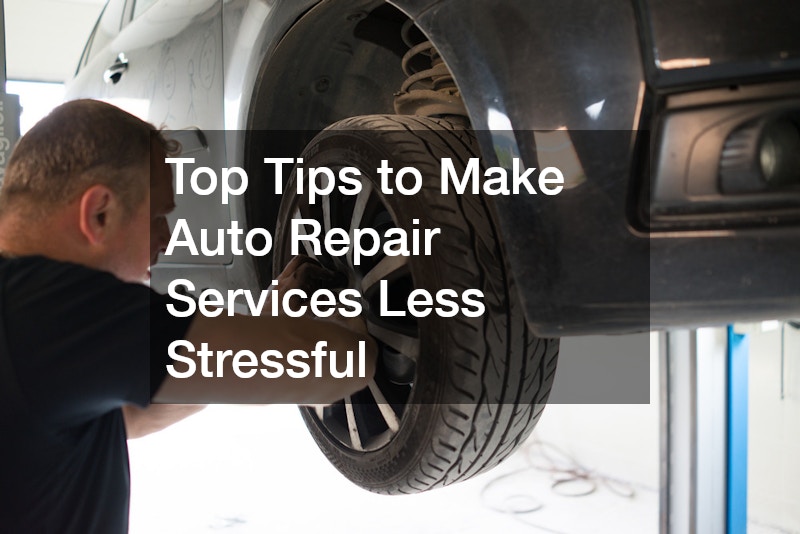
Auto repair can often be a daunting experience for car owners. The anxiety of leaving your vehicle in someone else's hands, combined with the uncertainty of potential costs, can create a stressful environment. However, by implementing strategies to streamline the process, you can significantly alleviate the pressure associated with auto repair services. This article will offer practical tips to make your next auto repair experience more manageable and straightforward.
Video Source
Finding a reliable auto repair shop requires thorough research and diligence. Start with personal recommendations from friends, family, or colleagues who have had positive experiences. Online reviews and ratings can also provide insights into a shop's reputation, so consider checking platforms like Google Reviews, Yelp, or the Better Business Bureau. These resources can give you a clearer idea of what to expect from different establishments.
Next, look for certifications that demonstrate the shop's qualifications and expertise. The National Institute for Automotive Service Excellence (ASE) certification is a notable credential indicating that technicians have met certain standards of knowledge and are qualified to perform repairs correctly. Additionally, membership in trade organizations can signal a commitment to up-to-date skills and ethical practices.
Don’t forget to consider location and convenience. A nearby shop can save you valuable time and hassle, especially if you need to drop off your vehicle for repairs. Visit potential shops in person, if possible; observing how they operate, along with speaking to the staff, can help you gauge their professionalism and customer service approach. Gathering this information lays a solid foundation for your auto repair experience.
Before heading to the repair shop, gather all relevant information regarding your vehicle's performance. Note any issues you've experienced, such as unusual noises, warning lights, or changes in handling; this will provide the mechanic with a clear understanding of the problems you're facing. Keeping a detailed log of repairs, services, and parts replaced can also be beneficial, as it provides context for the current visit.
Asking the right questions is crucial prior to servicing your vehicle. Prepare to inquire about estimates, timelines for the repairs, and potential additional costs involved. This proactive approach not only clarifies what to expect but also reduces surprises when it comes time to settle the bill. Open communication is key to ensuring you are informed throughout the process.
Lastly, consider reviewing your car's manual for any specific maintenance recommendations or intervals. Understanding what the manufacturer suggests can help you engage in conversations with your mechanic effectively. Being informed about what your vehicle needs allows you to be an active participant in its care, thereby reducing any anxiety you may have about the situation.
Effective communication with your mechanic is essential for a stress-free repair experience. Start with articulating your concerns clearly; describe the symptoms of your vehicle's issues in detail to ensure the technician understands your observations. Using straightforward language and avoiding jargon will facilitate a more productive conversation, enabling the mechanic to diagnose the problem more accurately.
Moreover, don’t hesitate to ask questions regarding the repair process. Understand what services are being performed and why, as well as any parts being replaced. When discussing the estimate, ask for clarification on charges if something seems unclear. Transparency in communication helps build trust and minimizes confusion, contributing positively to the overall experience.
Finally, express your expectations about timelines and costs openly. Understanding how long repairs will take and the financial implications can help you plan accordingly. A good mechanic will appreciate your candidness and work with you to meet your needs, creating a cooperative environment where you feel valued and respected as a customer.
Being aware of common signs that your car needs repairs can save you from more severe issues down the line. Look out for warning lights on your dashboard, unusual noises like grinding or squealing, or a decrease in performance such as difficulty in starting, which all indicate that something requires your attention. Taking action upon noticing these signs early can prevent minor problems from escalating into costly repairs.
When you identify a potential issue, document it, and if necessary, take a test drive to confirm the problem's consistency. Understanding the specific symptoms helps you articulate the issue effectively to your mechanic. This proactive approach not only aids in quicker diagnosis but also reduces any feelings of stress associated with uncertainty regarding your vehicle's condition.
Upon addressing these symptoms with your mechanic, maintain an open dialogue. Discuss the potential causes and solutions presented to you, as well as any further steps you should take. Being informed about the repairs needed instills confidence in the process and empowers you to make informed decisions, making the repair experience less daunting.
